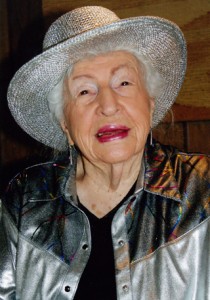
A former member of the Communist Party who could brag of an FBI file over four hundred pages in length that monitored her political activity, Elsie Gilland Fox was a tireless and formidable activist and community builder from Miles City, Montana. Her modest upbringing in rural eastern Montana shaped her sense of economic justice, and Fox spent her life advocating democratic social change to alleviate the inequalities of the capitalist system.
Elsie Gilland was born on a Powder River ranch south of Broadus in 1907. Her parents divorced when she was four, leaving her mother, Marcie, to homestead and raise three young children by herself. Living on the edge of poverty meant that each member of the family had to contribute to the economic production of the homestead, and Elsie recalled planting potatoes and cleaning the chicken coop to help out. From her brother, she also learned how to hunt and fish, and fishing would become her lifelong love: “Whenever I’ve had a real crisis, fishing has brought me out of it,” she said in later years. “It’s being out of doors, the movement of the water, hearing the birds sing. Lots cheaper than a psychiatrist.”
![Growing up in poverty in eastern Montana, Elsie watched as her divorced mother struggled to meet the family's basic needs. She vowed at an early age “never [to] rely on a man for money.” Photo courtesy Karen Stevenson](https://montanawomenshistory.org/wp-content/uploads/2014/01/038-fox-girl-149x300.jpg)
Elsie Gilland graduated from high school in Miles City in 1924 and, after two years of college in Wyoming, moved to Seattle, where she obtained work at an advertising agency. She was fortunate enough to keep her job during the Great Depression, but the suffering she witnessed all around her radicalized her, and in 1933 she joined the Communist Party. An active party member, she taught classes on Marxism and held demonstrations against evictions. It was while volunteering for the party-run paper, Voice of Action, that she met her future husband, union organizer Ernie Fox.
After their marriage, and after moving to San Francisco during World War II, the Foxes continued to work for Communist Party causes, although Elsie eventually became disillusioned with the party’s totalitarian, Soviet-style of leadership.
Elsie and Ernest separated in 1962 but remained close friends until his death in 1963. In 1973, after a long career with the International Longshoremen and Warehouse Union, Fox retired to a modest trailer home in Miles City. She brought her fiery brand of advocacy back to her home state. As Stevenson put it, “Elsie may have retired from a nine-to-five job, but she never retired from activism.”
Until her death in 2011 at age 103, Elsie Fox worked passionately to further causes ranging from women’s rights to economic and racial justice. She remained especially committed to the principles of democratic socialism. Speaking at a Mother’s Day event in Bozeman in 2006, the ninety-nine-year-old Fox recalled the radicalizing effect of the depression and called for a renewed challenge to the injustices of capitalism: “President Hoover told us that the benefits of big business would trickle down to the people. Sound familiar? And what did we, the people, do? We, the people, marched from one end of the country to the other to demand change. . . . We, the people, united to help our neighbors. . . . That’s the way it happened, folks. We did it then; you can do it now!” AH
Elsie Fox was not the only person who recognized the hard work of rural homekeepers. Read “The Work Was Never Done: Farm and Ranch Wives and Mothers.”
You might enjoy reading more blog posts about women activists or blog posts about women politicians.
Sources
“Speaking Her Mind,” Billings Gazette, August 2, 2009, pp. 1E, 3E.
“Elsie Gilland Fox” (obituary), Billings Gazette, November 10, 2011. Accessed January 7, 2014.
Kahn, Brian. “Elsie Fox: Still Here.” The Nation, April 16, 2009. Accessed January 7, 2014.
Stevenson, Karen, with Elsie Fox. Elsie Fox: Portrait of an Activist. New York: iUniverse, 2008.
Are there books that detail the lives of these remarkable women? I am currently reading “The Worst Hard Time” by Timothy Egan. A special book about special people.
Thanks for asking! These essays are all collected in the book Beyond Schoolmarms and Madams: Montana Women’s Stories. Many of the other people featured on the blog have books or articles about them, including Elsie Fox, who Karen Stevenson helped write a very interesting autobiography (Stevenson, Karen, with Elsie Fox. Elsie Fox: Portrait of an Activist. New York: iUniverse, 2008.) You can look at the source list at the bottom of each entry to get ideas for further reading. You can also find great reads from our research page (https://montanawomenshistory.org/research/) or our list of book club suggestions (https://montanawomenshistory.org/how-to-celebrate/book-club-ideas/). You can buy many of the books through our museum store (https://app.mt.gov/store/cart?storeID=mhsonline) or your local bookseller. Happy reading!